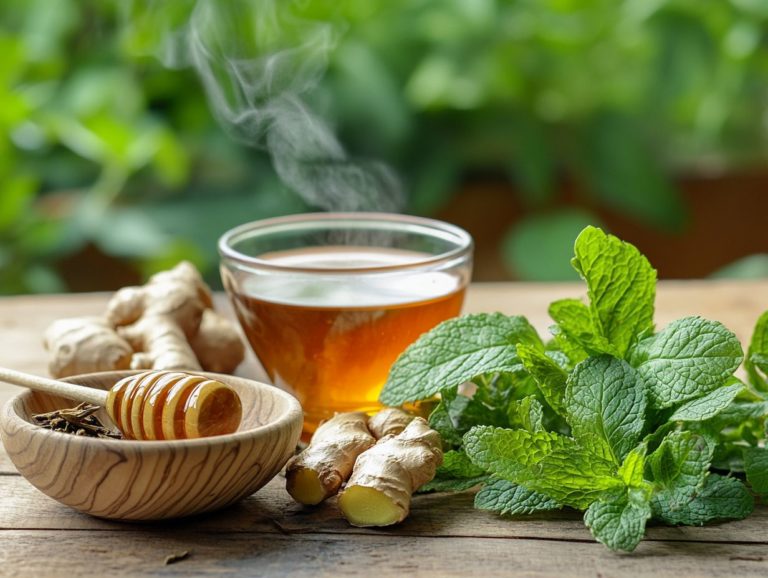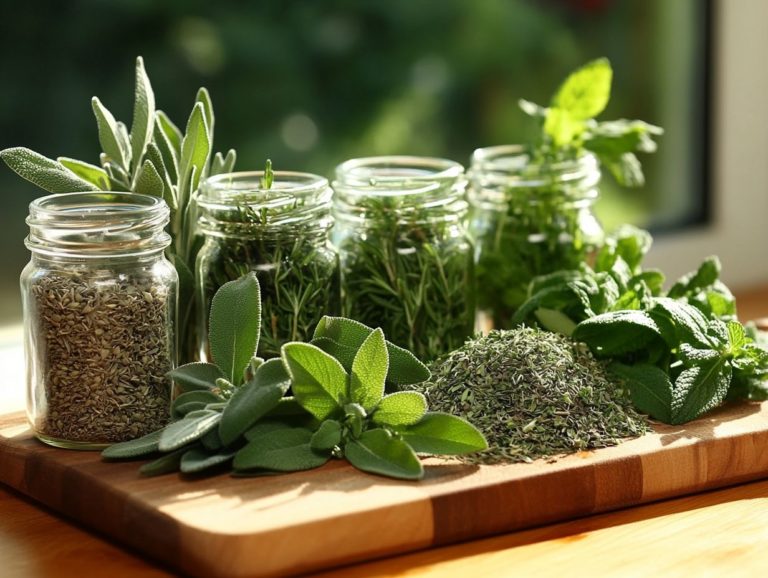5 Popular Herbs for Healthy Digestion
Digestive health is crucial for your overall well-being, and nature provides an abundance of herbs to assist you in this journey.
This article explores five well-known herbs ginger, peppermint, fennel, turmeric, and chamomile each with distinct benefits for enhancing digestion.
You ll learn how to easily incorporate these herbs into your diet, understand any potential side effects, and discover additional herbs that can boost your digestive system.
Prepare to elevate your gut health and explore these exceptional natural remedies, including botanical remedies that support your digestive system!
Contents
Key Takeaways:
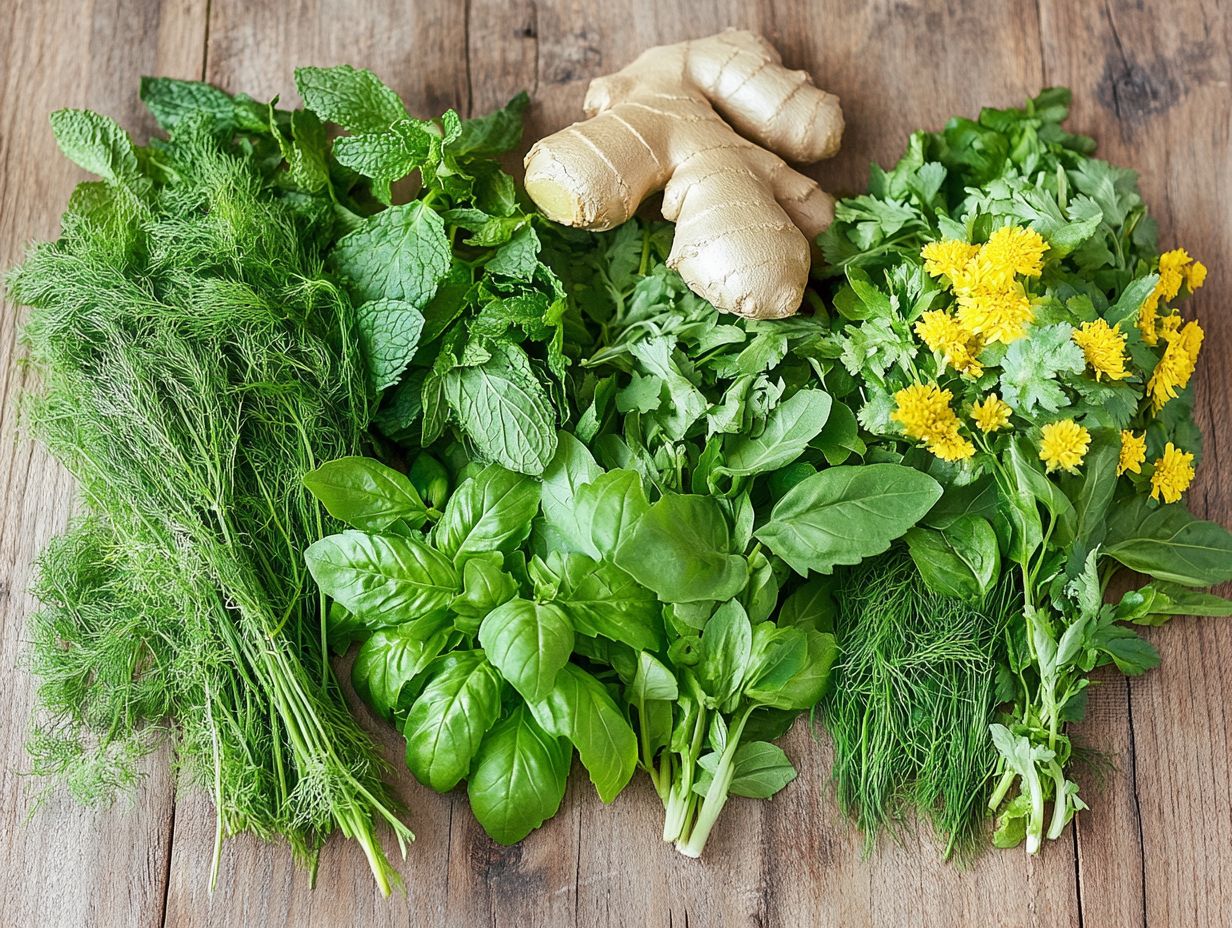
- Ginger can relieve digestive discomfort and improve overall digestive health.
- Peppermint helps soothe digestive issues, such as bloating and gas.
- Fennel is effective for digestive ailments, including indigestion and stomach cramps.
1. Ginger
Ginger, scientifically known as Zingiber officinale, is a remarkable herb celebrated for its impressive digestive health benefits. It alleviates gastrointestinal discomfort and enhances nutrient absorption, making it a cornerstone of herbal medicine.
This versatile root also offers notable anti-inflammatory properties that help soothe upset stomachs and contribute to your overall wellness. You might enjoy ginger as a comforting herbal tea or as a supplement for a more concentrated effect.
Historically, ginger has been vital in traditional medicine across various cultures, highlighting its long-standing value in promoting health. Today, it remains relevant, as many integrate this potent ingredient to harness its multifaceted benefits for improving digestive health.
2. Peppermint
Peppermint, sourced from the plant Mentha x piperita, is an excellent medicinal herb known for its many benefits for digestive health. It soothes the gastrointestinal tract and alleviates various digestive issues.
Its ability to relax the muscles in your digestive system significantly reduces discomfort from bloating and gas. For relief, consider sipping a warm cup of peppermint tea your body will thank you.
You can also massage essential oils onto your abdomen for targeted relief or use enteric-coated capsules for effective delivery to your intestines. By incorporating peppermint into your routine, you may enjoy improved digestive comfort and overall well-being.
3. Fennel
Fennel, scientifically known as Foeniculum vulgare, is celebrated for its ability to support digestion and alleviate symptoms of indigestion and other disturbances.
With its impressive ability to relieve bloating and gas, fennel has been embraced in culinary traditions around the world. You can easily incorporate fennel into your daily meals; for example, enjoying a warm cup of fennel tea can help digestion after meals.
Alternatively, sprinkle the aromatic seeds onto salads or use them as seasoning in your dishes, enhancing flavor while boosting your digestive process. Fennel supplements are also available for those preferring a concentrated option.
Adding this herb to your diet can be a simple yet impactful step towards achieving better digestive health.
In conclusion, incorporating these herbs into your daily routine can significantly enhance your digestive health. Starting with ginger in your morning smoothie or sipping peppermint tea can be delightful ways to experience the healing properties of common herbs. Remember, a healthy digestive system is key to your overall well-being!
4. Turmeric
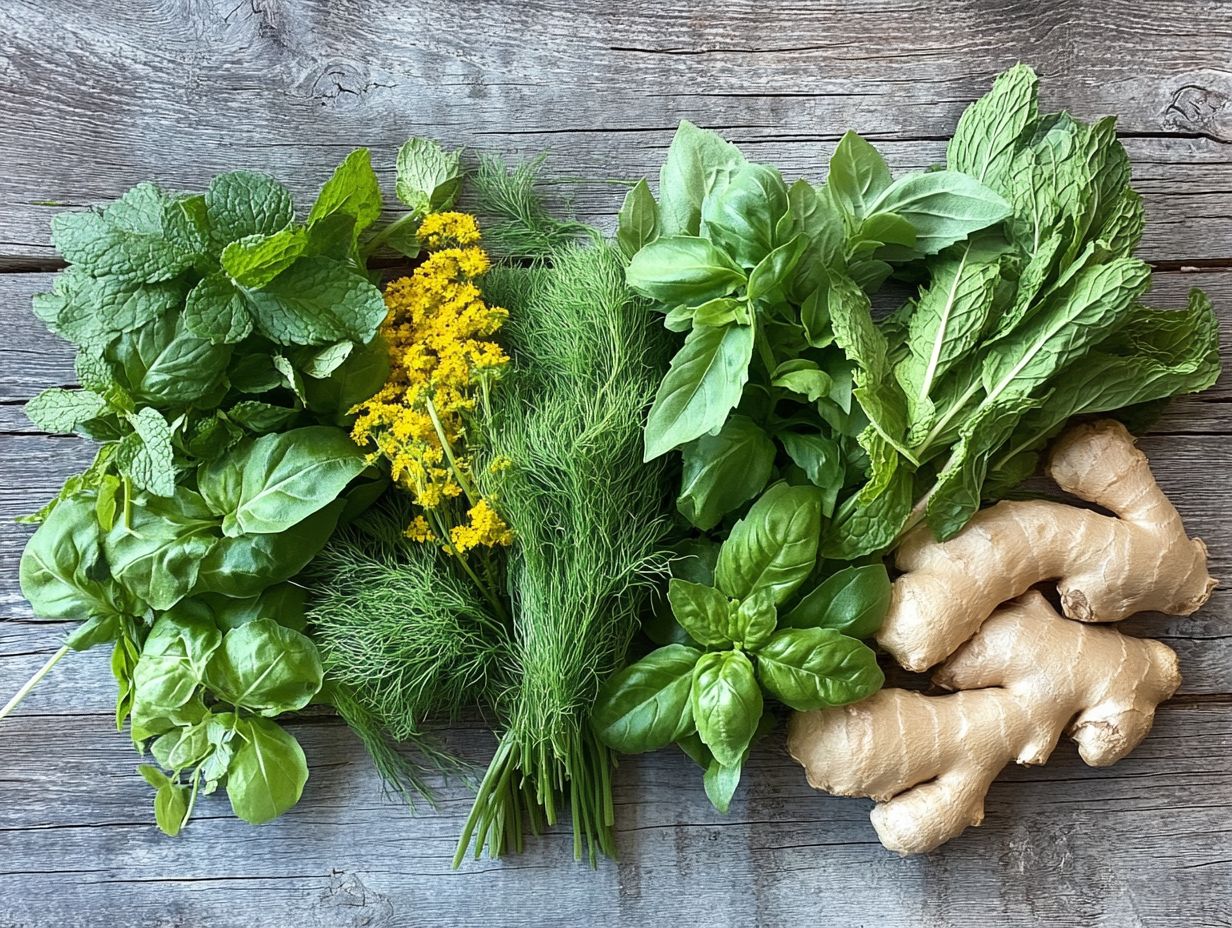
Turmeric, that vibrant yellow spice from the root of Curcuma longa, is celebrated for its powerful antioxidant properties and its role in supporting gastrointestinal health.
By reducing inflammation and promoting digestive wellness, it has firmly established itself as a cornerstone in both culinary delights and herbal remedies.
Research shows that the curcumin compound in turmeric can help with irritable bowel syndrome and inflammatory bowel disease.
To use turmeric daily, sprinkle it into soups, stir it into rice, or blend it into smoothies. For more concentrated benefits, consider capsule supplements.
This remarkable spice not only helps reduce gastrointestinal inflammation but also balances your body’s responses to various stressors, ultimately enhancing your overall well-being.
5. Chamomile
Chamomile, or Matricaria recutita, is a gentle herb known for its calming effects. It helps with anxiety and supports digestion by easing discomfort.
This herb is equipped with soothing properties that can significantly alleviate stress-related digestive issues, like bloating and cramps.
When enjoyed as a warm tea or in herbal tinctures, chamomile delivers a gentle yet powerful relief, allowing your gastrointestinal tract to unwind. That warm infusion not only hydrates but also creates a comforting experience that can soothe an anxious stomach.
You ll be amazed to find that a simple cup of chamomile tea before meals enhances your digestion and contributes to overall well-being, solidifying its reputation as a trusted companion in the world of natural remedies.
What Are the Benefits of These Herbs for Digestion?
The benefits of herbs like ginger, peppermint, fennel, turmeric, and chamomile for digestion are truly impressive. They can enhance gastrointestinal health, improve nutrient absorption, and provide relief from various digestive issues.
Incorporating these herbs into your daily routine is essential for a healthier gut. Don t wait start enjoying these natural remedies today!
- Ginger: Soothes nausea and promotes healthy digestion.
- Peppermint: Eases bloating and gas.
- Fennel: Reduces intestinal spasms.
- Turmeric: Supports gut health with its antioxidants.
- Chamomile: Calms digestion and reduces stress.
Take ginger, for example; it s celebrated for its anti-inflammatory properties and is often recommended in traditional medicine to soothe nausea and encourage healthy digestion.
Then there s peppermint, known for its ability to ease bloating and gas, making it a go-to for anyone who feels uncomfortable after meals. Fennel seeds, with their carminative properties, can help minimize intestinal spasms, providing much-needed relief.
Don t overlook turmeric either; its curcumin content offers powerful antioxidant effects that support a flourishing gut microbiome by nurturing beneficial bacteria. Finally, chamomile acts as a calming agent, helping to alleviate stress-related digestive issues, thus enhancing not just your physical health but also your mental well-being.
How Can These Herbs Be Used for Digestive Health?
Incorporating herbs like ginger, peppermint, fennel, turmeric, and chamomile into your diet can significantly enhance your digestive health. You have a variety of methods at your disposal.
Enjoy these herbs as soothing teas. Steep dried leaves or roots in hot water to allow the beneficial compounds to infuse beautifully.
If you value convenience, tinctures offer a concentrated form that can be easily added to water or taken directly. Capsules are another option, delivering the desired dosage without any taste perfect for your on-the-go lifestyle.
Incorporating these herbs into your everyday cooking can elevate your meals while promoting wellness. Imagine how a sprinkle of turmeric can transform your curry into a health-boosting dish!
However, it’s essential to consider the recommended dosages, as moderation is key. Incorporating 5 herbs for enhancing longevity into your routine can further support your health. Balancing these herbal preparations with a varied diet ensures you reap comprehensive digestive benefits and maintain a healthy diet.
Are There Any Risks or Side Effects of Using These Herbs?
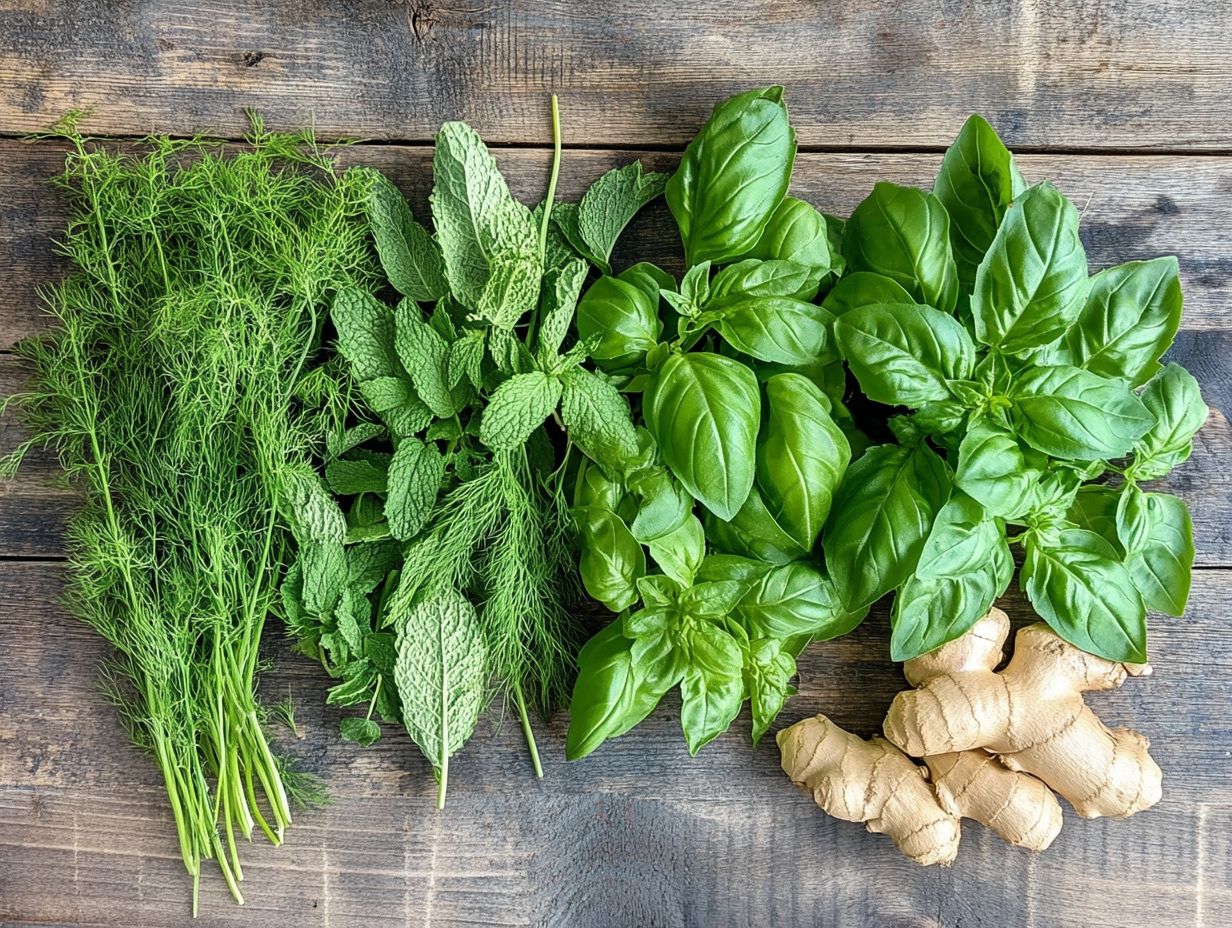
While herbs like ginger, peppermint, fennel, turmeric, and chamomile present a wealth of benefits for digestion, it’s crucial to consider the potential risks and side effects. Individual reactions can vary widely, so what works wonders for one person might lead to stomach upset or negative interactions with other medications for another.
Take ginger, for example. It s effective for soothing nausea. However, for some, it might trigger heartburn or digestive upset.
Peppermint can amplify heartburn, particularly for those with a condition where stomach acid flows back into the esophagus, causing discomfort. Fennel, while beneficial, has been associated with allergic reactions in sensitive individuals.
Turmeric, celebrated for its anti-inflammatory properties thanks to curcumin, could interact with blood-thinning medications. And let s not forget chamomile; though it s calming, it may provoke allergic reactions in those sensitive to plants in the daisy family.
Given these nuances, it s essential to consult a healthcare provider, such as Dr. Mary James, before embarking on any herbal regimen. This way, you can ensure safety and appropriateness, keeping in mind that the efficacy and safety profiles of these herbs can greatly differ based on individual health conditions.
What Are Some Other Herbs That Can Aid in Digestive Health?
In addition to ginger, peppermint, fennel, turmeric, and chamomile, you ll find several other herbs like Triphala, Psyllium, and Mu a that are highly regarded for their ability to support digestive health and enhance gastrointestinal function.
Take Triphala, for instance. This traditional Ayurvedic remedy is a potent blend of three fruits that not only aids in detoxification but also encourages regular bowel movements.
Then there’s Psyllium, derived from the seeds of the Plantago ovata plant. It works as both soluble and insoluble fiber, improving digestion and alleviating constipation with impressive efficacy.
Mu a, although lesser-known, deserves a spotlight for its anti-inflammatory properties that soothe the digestive tract and help reduce bloating. The beauty of these herbs lies in their versatility; they can be consumed as teas, capsules, or powders.
Start experimenting with these herbs today for an instant health boost! They make it easy to weave them into your daily wellness routine and effectively promote gut health.
How Can One Incorporate These Herbs into Their Diet?
Incorporating herbs like ginger, peppermint, fennel, turmeric, and chamomile into your diet is simpler than you might think. You can easily heighten your digestive support and overall wellness with methods like herbal teas, culinary uses, and dietary supplements.
Exploring these herbs can be a tasty adventure for your health! For a refreshing herbal tea, consider steeping fresh peppermint leaves with a touch of honey. You can also unwind by blending chamomile with warm water for a calming bedtime ritual. Additionally, incorporating the 5 best herbs for digestive health into your routine can provide even more immediate benefits. Try these recipes today!
Boost your smoothies with a zesty kick of ginger or a splash of turmeric for its vibrant golden hue. Sprinkle dried fennel or turmeric on roasted vegetables to enhance flavor while reaping nutritional rewards.
Dietary supplements can also provide these herbs easily. Remember that prioritizing a balanced diet rich in whole foods is key. This holistic approach maximizes your digestive health and elevates your overall well-being.
Frequently Asked Questions
1. What are the 5 Popular Herbs for Healthy Digestion?
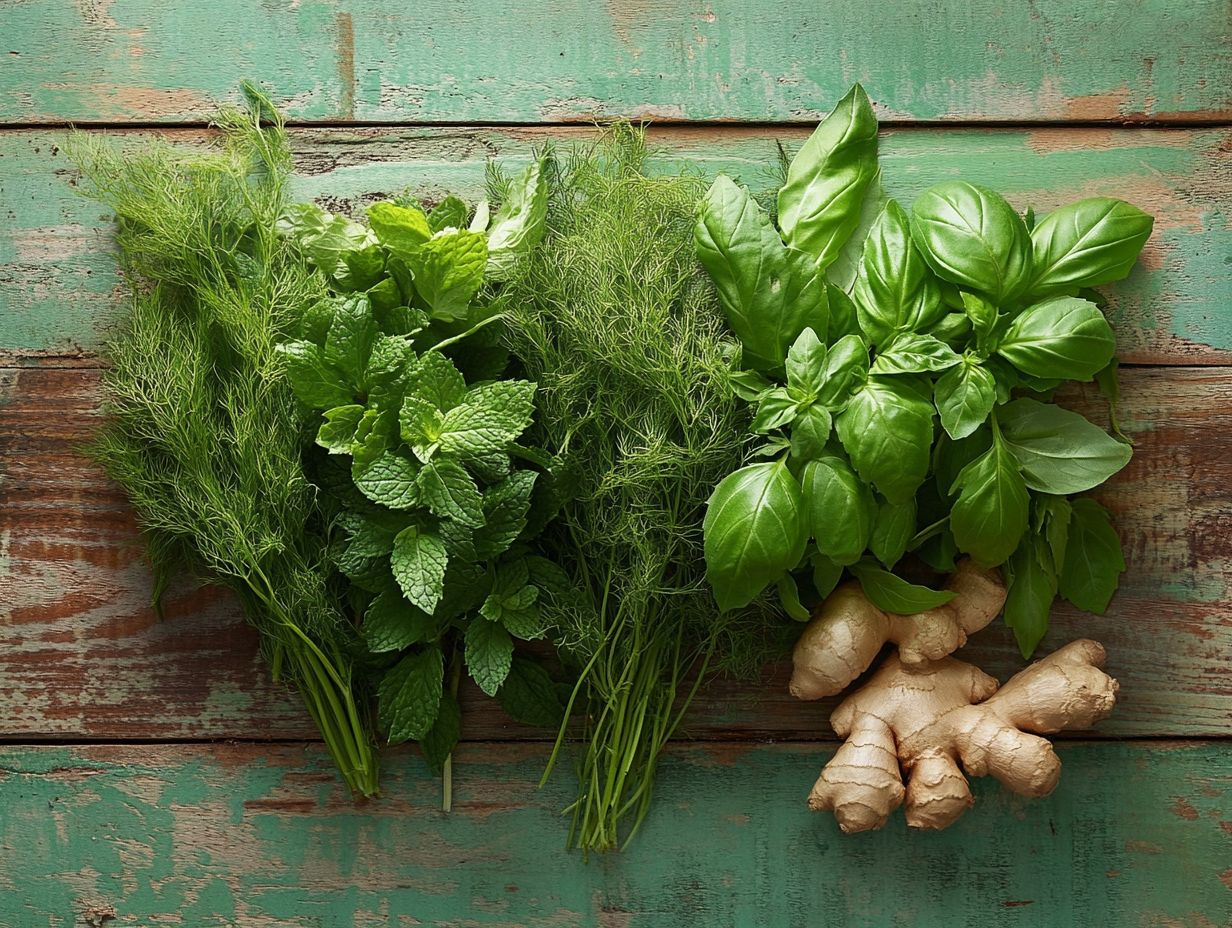
The 5 popular herbs for healthy digestion are ginger, peppermint, fennel, chamomile, and turmeric. These herbs have been used for centuries to aid in digestion and promote overall digestive health.
2. How does ginger help with digestion?
Ginger contains compounds that stimulate digestion and increase the production of digestive enzymes. It also helps reduce inflammation, soothing digestive issues such as bloating and nausea.
3. What are the benefits of using peppermint for digestion?
Peppermint relaxes the muscles of the digestive tract, helping to relieve symptoms of irritable bowel syndrome (IBS) and other digestive issues. It also calms the stomach, making it useful for nausea and indigestion.
4. Can fennel improve digestion?
Yes, fennel has been used in traditional medicine to aid in digestion and soothe stomach discomfort. It contains anethole, which helps relax the muscles of the digestive tract and reduce bloating and gas.
5. How does chamomile promote healthy digestion?
Chamomile has properties that help soothe digestive issues such as gastritis and IBS. It also contains compounds that relax the muscles of the digestive tract, relieving cramping and bloating.
6. Is turmeric beneficial for digestive health?
Turmeric contains curcumin, which has anti-inflammatory and antioxidant qualities. This can improve digestion and reduce symptoms of digestive disorders such as ulcerative colitis and Crohn’s disease.



